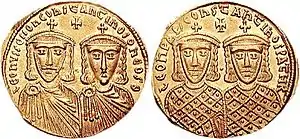797
Year 797 (DCCXCVII) was a common year starting on Sunday (link will display the full calendar) of the Julian calendar. The denomination 797 for this year has been used since the early medieval period, when the Anno Domini calendar era became the prevalent method in Europe for naming years.
| Millennium: | 1st millennium |
|---|---|
| Centuries: | |
| Decades: | |
| Years: |
| 797 by topic |
|---|
| Leaders |
|
| Categories |
|
| Gregorian calendar | 797 DCCXCVII |
| Ab urbe condita | 1550 |
| Armenian calendar | 246 ԹՎ ՄԽԶ |
| Assyrian calendar | 5547 |
| Balinese saka calendar | 718–719 |
| Bengali calendar | 204 |
| Berber calendar | 1747 |
| Buddhist calendar | 1341 |
| Burmese calendar | 159 |
| Byzantine calendar | 6305–6306 |
| Chinese calendar | 丙子年 (Fire Rat) 3493 or 3433 — to — 丁丑年 (Fire Ox) 3494 or 3434 |
| Coptic calendar | 513–514 |
| Discordian calendar | 1963 |
| Ethiopian calendar | 789–790 |
| Hebrew calendar | 4557–4558 |
| Hindu calendars | |
| - Vikram Samvat | 853–854 |
| - Shaka Samvat | 718–719 |
| - Kali Yuga | 3897–3898 |
| Holocene calendar | 10797 |
| Iranian calendar | 175–176 |
| Islamic calendar | 180–181 |
| Japanese calendar | Enryaku 16 (延暦16年) |
| Javanese calendar | 692–693 |
| Julian calendar | 797 DCCXCVII |
| Korean calendar | 3130 |
| Minguo calendar | 1115 before ROC 民前1115年 |
| Nanakshahi calendar | −671 |
| Seleucid era | 1108/1109 AG |
| Thai solar calendar | 1339–1340 |
| Tibetan calendar | 阳火鼠年 (male Fire-Rat) 923 or 542 or −230 — to — 阴火牛年 (female Fire-Ox) 924 or 543 or −229 |

Gold solidus of Constantine VI and Leo IV
Events
Byzantine Empire
- April 19 – Empress Irene organizes a conspiracy against her son Constantine VI. He is captured and blinded; Irene exiles him to Principo, where he dies shortly thereafter of his wounds. Irene begins a 5-year reign, and calls herself basileus ("emperor") of the Byzantine Empire.
Europe
- King Charlemagne issues the Capitulare Saxonicum, making Westphalian, Angrian and Eastphalian Saxons equal to other peoples in the Frankish Kingdom. The Nordalbian Saxons revolt; a Frankish fleet is sent to the North Sea coast of Germany. It lands in Hadeln, a marshy coastal region between the Weser and Elbe estuaries, near modern-day Cuxhaven. Charlemagne invades northern Saxony, and again accepts the submission of the Saxons.[1]
Births
Deaths
- February 6 – Donnchad Midi, High King of Ireland
- Æthelberht of Whithorn, Anglo-Saxon bishop
- Al-Hasan ibn Qahtaba, Muslim military leader
- Bermudo I, king of Asturias (approximate date)
- Caradog ap Meirion, king of Gwynedd (approximate date)
- Constantine VI, emperor of the Byzantine Empire (b. 771)
- Cummascach mac Fogartaig, king of South Brega
- Guan Bo, chancellor of the Tang Dynasty (b. 719)
- Muireadhach mac Olcobhar, Anglo-Saxon abbot
References
- David Nicolle (2014). The Conquest of Saxony AD 782–785, p. 81. ISBN 978-1-78200-825-5
This article is issued from Wikipedia. The text is licensed under Creative Commons - Attribution - Sharealike. Additional terms may apply for the media files.